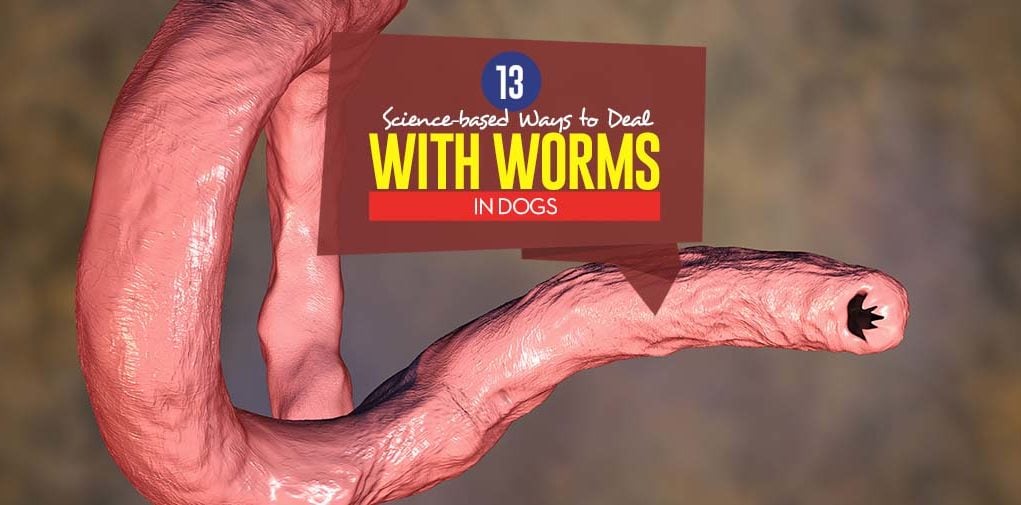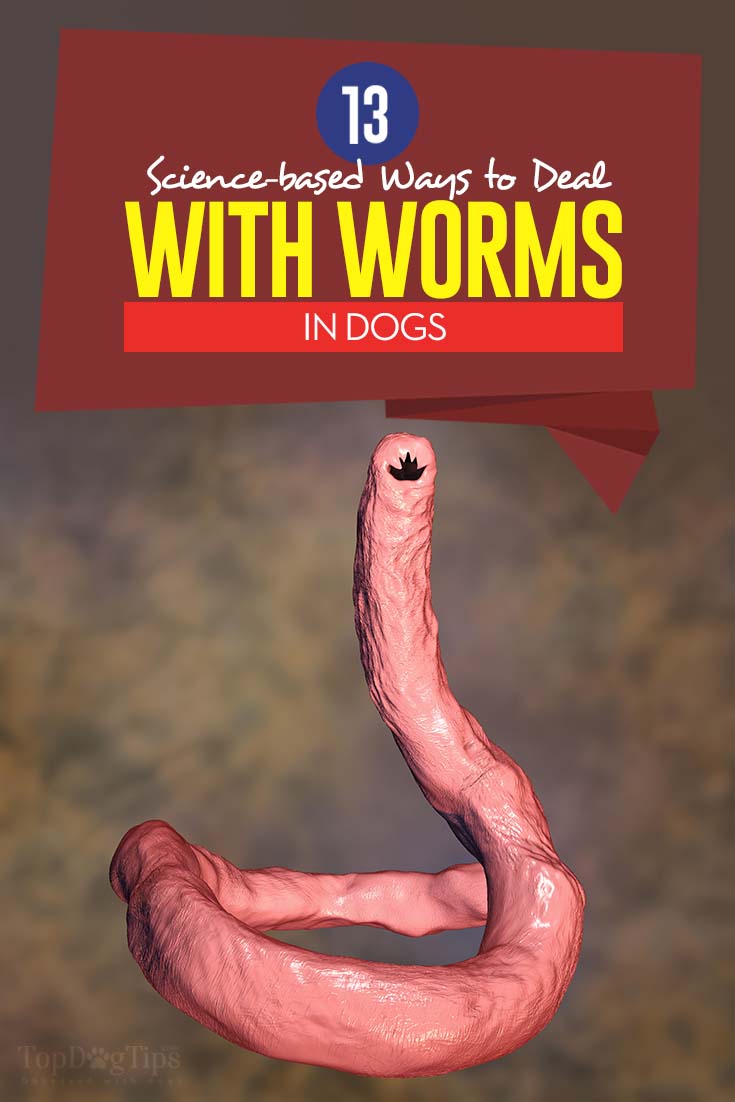Dogs can be victims of intestinal parasites known as worms. These parasites can cause mild symptoms such as stomach upset and diarrhea, but if left untreated they can ultimately lead to death of your pet. Worms in dogs are more common than you think, so it's important for every pet owner to know the symptoms and treatments to get rid of these pests.
In one study, it was shown that the prevalence of worms in the dog population can be as high as 54.3%, depending on the geographical location (Katagiri et al. 2008). In a pet store in Atlanta, it was found that 52% of puppies had at least one type of parasite.
The most common types include roundworms, hookworms, whipworms, and tapeworms. Some of these worms can be seen in your dog's stool or vomit, while others can only be discovered through testing at your veterinarian's office.
Signs your dog might have worms include:
- diarrhea, sometimes with worms or blood
- weight loss
- dry hair
- vomiting (sometimes with worms)
- general poor appearance
- bloated stomach or belly
This article will review the different types of worms and ways to help prevent them. As with any medical problem, it's best to seek veterinary care if you need help preventing, diagnosing and treating worms in your pet.
ALSO READ: How to Deworm a Dog – A Guide for Pet Owners
13 Ways to Deal With Worms in Dogs
1. De-Worming Drugs
Deworming drugs are also referred to as anthelmintics, and for decades they have been shown in clinical trials to be effective to fight off pinworms, hookworms and whipworms in dogs (McCowen et al. 1957).
In general, deworming drugs work by selectively target a particular site on the parasite, such as a protein, forcing them to release hold of your dog’s intestinal wall. This makes it easier for your dog to excrete the worms from its body.
The most commonly prescribed canine deworming medications include the following:
- Levamisole
- Niclosamide
- Praziquantel
- Albendazole
- Diethylcarbamazine
- Ivermectin
- Tiabendazole
However, it is important to note that deworming drugs for dogs typically contain a chemical called Fenbendazole.
Fenbendazole does have some side effects, which have been shown in studies. For example, it may cause bone marrow hypoplasia (Gary et al. 2004), vomiting, depression and lethargy, diarrhea, anorexia and even death in some animals (Gozalo et al. 2006). Other common ingredients in dog deworm drugs, pyrantel and praziquantel, have similar negative side effects. They're not common, but it's something to keep in mind.
2. Fruits and Vegetables
Feeding your pet fruits and vegetables may be an effective way to treat and prevent worms. Raw carrot, watercress, greens, squash, fennel, papaya, or pumpkin can help make your dog’s intestinal tract less attractive to worms.
Carrots contain Vitamin A, which can help eliminate roundworms. For example, one study with animals showed that a Vitamin A deficiency reduces the frequency of antibody secretion by B lymphocytes that target parasite antigens (Carman et al. 1992).
Papaya at 2, 4, and 8 g per kg has an antiparasitic effect to eliminate intestinal worms in mammalian hosts (Satrija et al. 1995). Who knew that feeding your pooch fruits and vegetables could have such amazing health benefits?
Deworming your dog using fruits and veggies isn't the only reason to add them to your dog's diet, either. There are plenty of research pointing at the benefits of both vegetables and fruits for dogs, and how they can improve your dog's diet.
3. Coconut and Coconut Oil
Coconut is a vermifuge, meaning it can help eliminate tapeworms from the body. There's plenty of research available on the health benefits of both coconut and coconut oil. In one study in particular, the addition of 60g coconut for 8 days resulted in the complete elimination of worms from the animal’s feces after 9 and 20 days (Mehlhorn et al. 2011).
Coconut shells have also been traditionally used in Indian cultures for deworming. This is due to an alcohol extract in the shell that has antifungal properties, which may lead to effectively fighting off many types of parasites in the body (Venkataraman et al. 1980).
Several other studies have demonstrated the effectiveness of coconut extracts and coconut oil when fighting off intestinal parasites in different animals (Lima 2015; Costa 2010; Ghaffar 2011). The bottom line is that as long as coconut oil is known to be safe for canines, it can help to fight worms in dogs as well as improve many other health factors.
4. Probiotics and Digestive Enzymes
Probiotics are microorganisms, such as bacteria or yeast, that can be supplemented in food to control the intestinal flora of the host. Probiotics help maintain a good balance of healthy gut bacteria and strengthen your dog’s immune system. Now we've also seen how maintaining canine's good gut microbiota is important for dealing with dog worms.
Studies show that supplementation with Enterococcus faecium, a common probiotic, has an immune stimulating effect on young dogs which may lead to more effectively fighting off these parasites (Benyacoub et al. 2003). Supplementing with Lactobacillus acidophilus positively enhanced gut health in dogs by modifying the gut microbial populations (Swanson et al. 2002). A healthier intestinal system can make it easier for your dog to fight off parasitic infections, particularly the most common types of dog worms.
While some dog food brands include probiotics in their formulas, studies show that the amounts are so insignificant that they will not affect the dog in any way (Weese et al. 2003). The only way to add probiotics into a dog's diet is through exact dosage of probiotic supplements and some foods.
Digestive enzymes provide additional support for your dog’s digestive system to help eliminate parasites. For example, papain can kill worms and are best taken 30 minutes before or after meals. Digestive enzymes in general can keep your dog's gut in a healthier state which lets the animal's body fight off worms more easily.
5. Apple Cider Vinegar
 Apple Cider Vinegar has been a favorite of dog owners for decades now, and it turns out that there's a scientifically proven reasons for that. For starters, it has a natural alkalizing effect on the body (Shahidi et al. 2008).
Apple Cider Vinegar has been a favorite of dog owners for decades now, and it turns out that there's a scientifically proven reasons for that. For starters, it has a natural alkalizing effect on the body (Shahidi et al. 2008).
An alkaline system can prevent diseases, and cure existing infections by increasing the body’s oxygen intake in dogs. Cutting down on acidic foods and increasing foods that alkalize the system can help eliminate parasites when they’re present in the gut. Some studies suggest that other similar acidifying products may be helpful for dogs to fight off yeast and intestinal infections (Matousek et al. 2003).
6. Pumpkin Seeds
A few days ago we've published a full science-based review of pumpkin seeds for dogs and their effect on the canine population. Other than their health effects, it turns out that feeding raw pumpkin seeds can also help to prevent or expel worms.
In one study, pumpkin seeds were tested to evaluate its effect on Schistosoma japonicum, a parasite. In animals, pumpkin seeds were observed to reduce the worm load to one quarter that of the control group. Pumpkin seed treatment in subjects with severe schistosomal liver and heart damage resulted in a 22.6% parasite sterilization rate.
Pumpkin seeds have been studied as an anti-parasitic remedy for decades (Xiao et al. 2010). More studies are now showing up demonstrating the effect of pumpkin seeds against parasites in dogs, humans and livestock (Grzybek et al. 2016).
To get the best results from pumpkin seeds, it is recommended to roast and grind the seeds, and mix it with your dog’s regular food to prevent worms. In fact, while pumpkin is a good and healthy treat for dogs, based on what we've seen so far in research, it doesn't come close to the powerful effects of pumpkin seeds.
RELATED: Can Humans Get Worms From Dogs?
7. Diatomaceous Earth (DE)
Diatomaceous Earth (DE) is a naturally occurring siliceous rock that can be crumbled into a fine powder that has many health benefits. In one study with livestock, DE fed to animals reduced the number of parasites in their fecal eggs (Bennett et al. 2011). DE also improved overall health of the animals, as seen by increased weight and feed efficiency.
Diatomaceous Earth hasn't been well studied in dogs yet, with one study demonstrating its safety in dogs when administrated correctly (Wagner et al. 1968). But in many other animals, particularly farm animals, DE has been shown as an effective tool to fight off worms, other parasites as well as used as insecticide (Hosseini 2004; Alves 2006).
8. Chamomile
 Chamomile is a traditional medicinal herb that has been used for a number of ailments, including inflammation, muscle spasms, worms, parasites and gastrointestinal disorders. It's been studied for years and its effectiveness for killing worms and their eggs was demonstrated in several studies (Kheirabadi et al. 2007; Hajaji et al. 2017).
Chamomile is a traditional medicinal herb that has been used for a number of ailments, including inflammation, muscle spasms, worms, parasites and gastrointestinal disorders. It's been studied for years and its effectiveness for killing worms and their eggs was demonstrated in several studies (Kheirabadi et al. 2007; Hajaji et al. 2017).
In addition, chamomile has been shown to be an effective treatment in eliminating leeches, another natural parasite. In fact, chamomile was able to kill leeches after only 232.22 ± 45.19 minutes (Buhmani et al. 2015).
Chamomile has other benefits to peoples' and dogs' gastrointestinal system as well. These benefits include soothing the stomach and relaxing the muscles that move food and parasites through the intestines (Srivastava et al. 2010).
9. Black Walnut
Black Walnut contains an active ingredient called juglon that is highly toxic to insect herbivores (Dama et al. 1997). Studies have shown that juglone can eliminate parasitic worms from the body. However, there are some side effects to black walnut ingestion if given at the wrong dose, including vomiting, diarrhea, and gastritis.
In particular, it may be dangerous to dogs due to its negative effects and potentially cause syndromes with muscoskeletal and neurologic signs. In one study of 93 dogs, exposure to a higher amount of black walnut tree results in all of these signs, including vomiting (Coleman et al. 2016). Thus, a consultation with a vet must be necessary beforehand.
10. Garlic
The anti-parasitic effects of garlic have been known for decades. Use of a garlic clove juice was shown to be effective in inhibiting Fusarium, a pathogenic bacteria that can produce spores, thus, showing anti-fungal properties. Garlic treatment in Swiss mice had an anthelmentic effect against A. Tetraptera, wuth a 91.24% success rate (Ayaz et al. 2008). In vitro data also suggest that garlic has antiviral and antibacterial effects.
We know that onions and garlic are toxic to dogs, and even in small dosages can be extremely dangerous. This is important to keep in mind. However, there are proponents (usually holistic veterinarians) that claim that very low dosage of garlic may be beneficial for dogs' health as well as to fight off worms in dogs.
Dangers of garlic cannot be understated, however. Further to already known toxicity (Salgado et al. 2011), although there are no studies to confirm it, ingestion of cloves may also be associated with miscarriages in pregnant dogs, too.
11. Olive Leaf
Olive leaf has anti bacterial, anti-viral and antioxidant properties. Olive leaf at a dose of 600mg was shown to kill parasitic leeches in an average time of 145 ± 77.57 minutes (Karamati 2013).
The active ingredient in olive leaf is a chemical called oleopurin. Oleopurin triggers cell death of unicellular protozoan parasites, such as Leishmania. Oleopurin also exhibits anti-inflammatory properties, which can help with the side effects, such as bloating, caused by worms in the gastrointestinal tract.
12. Slippery Elm
Slippery elm is an herbal remedy that has traditionally been used in North America to coat and sooth the mouth, throat, stomach, and intestines. In general, slippery elm is a laxative that can sooth mucous membrane irritations caused by intestinal worms (Hawrelak et al 2010).
Furthermore, use of a proprietary formula containing slippery elm bark lead to several pleasant and unpleasant gastrointestinal effects: a significant increase in bowel movement frequency, bloating, abdominal pain, and improved stool consistency. Increased bowel movements can help to expel parasites from the dog's body.
Some proponents of the use of slippery elm for dogs and cats have been touting about its benefits for years, some of which include dealing with worms and tummy troubles.
13. Keep Your Dog’s Area Clean
 Finally, and most importantly, take care of the environment around your dogs. Although there are various foods or supplements that can help prevent parasites, perhaps the best way is to keep your dog’s area clean.
Finally, and most importantly, take care of the environment around your dogs. Although there are various foods or supplements that can help prevent parasites, perhaps the best way is to keep your dog’s area clean.
Not that we need evidence for that, but studies show over and over how fecal samples may harbor parasites; in some cases, parasites in stool samples can be as high as 51% (Bugg et al. 1999).
In general, worms are contracted through contact with contaminated soil or dog feces. In fact, there is evidence that dog feces are the primary reason for the high prevalence of the transmission of parasites to other dogs and even humans (Traub et al. 2002).
A survey shows that approximately only one third of dog owners do not understand the means of transmission for worms. Therefore, proper education and management may help to minimize the zoonotic transmission of parasites (Robertson et al. 2002).
Intestinal worms in dogs are as unpleasant as they sound. A canine that has them may act benign at first, but the discomfort and irritation to their intestinal tract will only grow if left untreated. Once these parasites enter the muscular tissue and bloodstream, the danger to your pet only increases.
Fortunately, there are natural and pharmaceutical treatments that can help ward off the spread of worms and eventually fight them off. The key is to notice the signs and act quickly, and try to prevent dog worms as often as possible.
READ NEXT: Heartworm Prevention in Dogs















